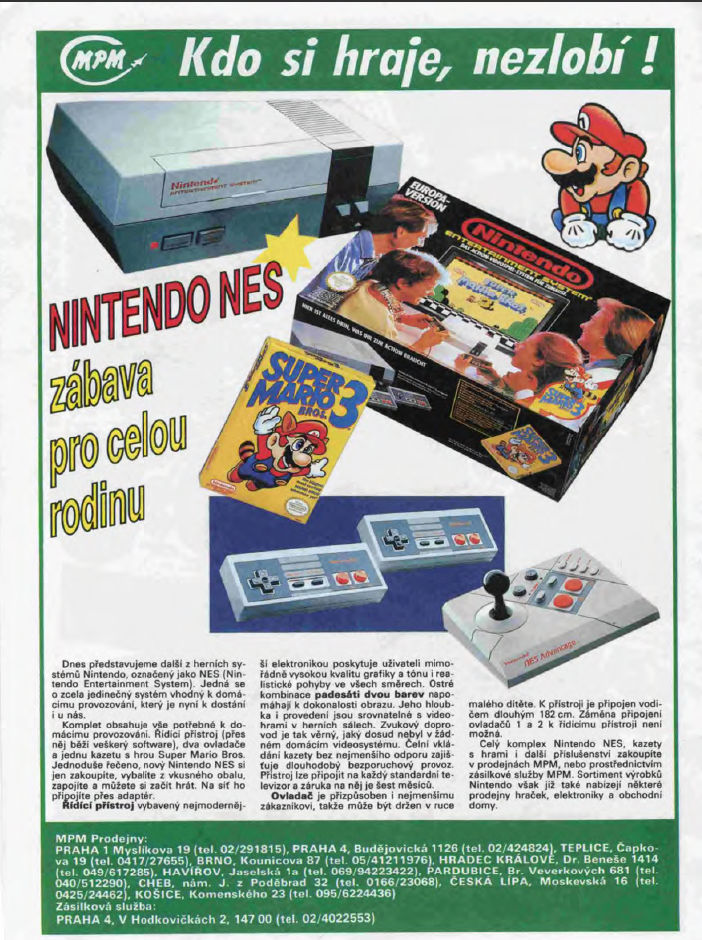Platform: Nintendo Entertainment System
Bomberman
Spot: The Video Game
Godzilla: Monster of Monsters
Mega Man 2
Wrecking Crew
Shockwave
Star Trek V: The Final Frontier
Who Framed Roger Rabbit
RoboCop 2
Mickey Mousecapade
Adventures of Lolo 3
Mega Man 4
Yoshi
Godzilla 2: War of the Monsters
Gyromite
Pictionary: The Game of Video Quick Draw
New Trivia!
Nuts & Milk
Yo! Noid
Snoopy's Silly Sports Spectacular!
MTV Remote Control
New Trivia!
Joust
Solstice: The Quest for the Staff of Demnos
Donkey Kong 3
River City Ransom
Teenage Mutant Ninja Turtles II: The Arcade Game
Captain America and the Avengers
Yeah Yeah Beebiss I
Kid Klown in Night Mayor World
Adventures of Lolo 2
Castlevania
Dragon Warrior IV
Home Alone 2: Lost in New York
Kung Fu
Chiller
Zelda II: The Adventure of Link
New Ghostbusters II
Disney's The Lion King
Mega Man 3
Ghosts 'n Goblins
Ninja Gaiden III: The Ancient Ship of Doom
Barbie
Attack of the Killer Tomatoes
Abadox: The Deadly Inner War
Disney's Darkwing Duck
Power Punch II
Blaster Master
Wheel of Fortune
Zombie Nation
The Adventures of Bayou Billy
Castlevania III: Dracula's Curse
Viewing Single Trivia
▲
2
▼
Popular conceptions about Nintendo's release history in Europe claim that their hardware was never released in the former Eastern Bloc until the 21st century. Rather, these countries instead saw the proliferation of various clone consoles called "Famiclones", such as the Dendy (a Taiwanese-built bootleg that achieved widespread popularity in the Commonwealth of Independent States, made up of the ex-republics of the former Soviet Union) and the Pegasus (which became as popular in Poland as the Dendy did in Eastern Europe). However, while Famiclones did indeed dominate the Eastern European gaming market during the 1990s, Nintendo was not only aware of this, but actively attempted to halt the spread of bootlegs in these regions in favor of officially sanctioned products.
In 1994, Nintendo made a deal with Steepler, the Dendy's distributor in Eastern Europe, to permit continued sale of the Dendy in exchange for equal distribution of the Super Nintendo Entertainment System and Game Boy in the Commonwealth of Independent States; official Russian releases of these systems even included Dendy stickers on the packaging to reflect the arrangement. Meanwhile, in various other parts of the former Eastern Bloc, Nintendo made deals with other third-party distributors; among others, the NES, SNES, and Game Boy saw official releases in Poland, Hungary, and the former territories of Yugoslavia and Czechoslovakia during 1993–1994.
In 1994, Nintendo made a deal with Steepler, the Dendy's distributor in Eastern Europe, to permit continued sale of the Dendy in exchange for equal distribution of the Super Nintendo Entertainment System and Game Boy in the Commonwealth of Independent States; official Russian releases of these systems even included Dendy stickers on the packaging to reflect the arrangement. Meanwhile, in various other parts of the former Eastern Bloc, Nintendo made deals with other third-party distributors; among others, the NES, SNES, and Game Boy saw official releases in Poland, Hungary, and the former territories of Yugoslavia and Czechoslovakia during 1993–1994.
Joshua Rogers video about Nintendo in Eastern and Central Europe:
https://www.youtube.com/watch?v=q75Re7deJC0
Russian-language articles about the Nintendo/Steepler deal:
https://web.archive.org/web/20190427025842/https://www.kommersant.ru/doc/94004
https://web.archive.org/web/20240601223552/https://dtf.ru/games/970617-legenda-o-slone-kak-it-kompaniya-steepler-sozdala-dendy-i-osnovala-rossiiskii-konsolnyi-rynok
https://www.youtube.com/watch?v=q75Re7deJC0
Russian-language articles about the Nintendo/Steepler deal:
https://web.archive.org/web/20190427025842/https://www.kommersant.ru/doc/94004
https://web.archive.org/web/20240601223552/https://dtf.ru/games/970617-legenda-o-slone-kak-it-kompaniya-steepler-sozdala-dendy-i-osnovala-rossiiskii-konsolnyi-rynok
Comments (0)
You must be logged in to post comments.
